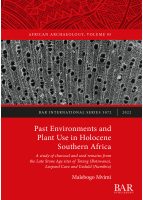Description
This book uses macrobotanical analysis (charcoal and seeds/grains) from Later Stone Age sites in Botswana and Namibia to address past climatic and environmental conditions in Southern Africa during the Holocene period, c. 2000 BP. One of its main objectives is to comprehend subsistence and overall socio-economic stratagems of human communities vis-à-vis their vegetal milieu. The majority of Southern Africa has comparatively few archaeobotanical studies, so this is the first archaeobotanical research from the site of Toteng and Botswana. Hence, this study draws equally from ethnographic inferences to understand current plant distribution and utilisation, which was achieved by using data collected among the San and Damara communities, found in the Erongo region, Namibia. Finally, a botanical reference collection was developed in order to facilitate the macrobotanical identification process, as well as to contribute to the initial reference bank that will later be developed for future research.
AUTHOR
Malebogo Mvimi is a lecturer in archaeology at the University of the Witwatersrand. She focuses mainly on plant use by past and present societies, ethnography, spatial analysis and environmental evolution in Southern Africa, from the Late Stone Age to more recent periods.
REVIEWS
‘Charcoal studies are still rare in southern Africa and this research is therefore very important for developing this field. The archaeobotanical data contributes with new knowledge about place and landscape that is not available from other methods.’ Dr Anneli Ekblom, Uppsala University
‘This book represents an important contribution to archaeobotanical research in South Africa, and in Africa in general. The archaeobotanical approach may be useful to deepen the history of the countries, to outline the existence of special - autochthonous - history in these regions, to discover the links between the past and current folk traditions, and to help future young researchers to work on the links between environment and culture in South Africa.’ Professor Anna Maria Mercuri, Università degli Studi di Modena e Reggio Emilia











